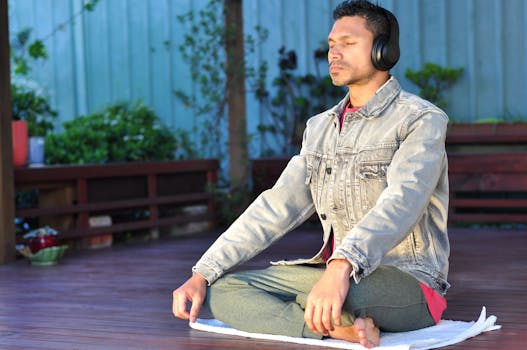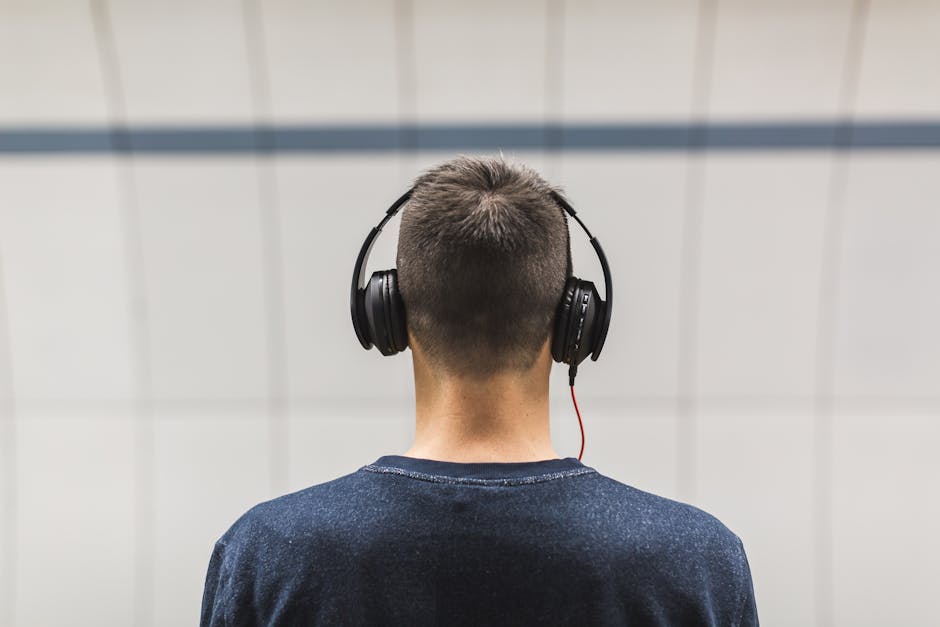Choosing the best binaural beats headphones can greatly improve your listening experience.
Whether you want to boost focus, reduce stress, or deepen meditation, having the right headphones can make all the difference.
In this guide, you’ll discover top picks, tips, and what to look for so you can find the perfect pair for immersive, high-quality sound and deeper brainwave entrainment.
Disclosure: This content does not contain affiliate links. However, affiliate links for each headphone mentioned may be added in the future. Please refer to the Affiliate Disclosure section on the Disclaimer page for more details.
Table of Contents
Introduction to Binaural Beats
What Are Binaural Beats?
Binaural beats aren’t just music—they happen when each ear hears a slightly different frequency.
Your brain combines these sounds and creates a third beat, called a binaural beat.
This response can guide your brain into different mental states depending on the frequency.
The brain’s natural habit of matching outside rhythms, known as the frequency following response, is what makes binaural beats effective.
Each brainwave frequency is associated with different mental and emotional states.
Here are examples of frequencies and their effects:
- Delta (0.5 – 4 Hz): Promotes deep sleep and supports body healing.
- Theta (4 – 8 Hz): Enhances creativity, intuition, and deep meditation.
- Alpha (8 – 13 Hz): Improves relaxation, meditation, and visualization.
- Beta (13 – 32 Hz): Boosts focus, concentration, and alertness.
- Gamma (32 – 100 Hz): Optimizes memory, learning, and peak cognitive performance.
Headphones are required (speakers won’t work) since each ear must hear a different tone.
To fully benefit from these effects, you need gear that can deliver precise, consistent frequency playback.
Disclaimer: Binaural beats are generally safe, but if you have a history of seizures or other neurological conditions, consult a healthcare professional before using them.
Learn more about using sound frequencies here
Benefits of Using Good Headphones for Binaural Beats
The right headphones make a big difference when listening.
Most regular stereo headphones or earbuds can work, as long as they clearly deliver separate sounds to each ear.
However, what makes certain headphones better is better results from listening and a great listening experience.
Good headphones enhance the experience with:
- Clearer sound and balanced audio
- Noise isolation for fewer distractions
- Comfort for longer listening sessions
- Better results for focus, relaxation, or sleep
9 Best Binaural Beats Headphones

Let’s dive into our top picks, ranging from budget-friendly to premium options.
🎧 Koss UR20: Best Budget Option
- Price range: $19-30
- Key features:
- Comfortable for long sessions, depending on the user
- Closed-back design
- Is it wireless? : No
- Best for: Beginners
- Key feature: Great Value
What’s great:
- ✅ Surprisingly good sound for the price, though it can vary greatly for different users
- ✅ Comfortable for long listening sessions, depending on the user
What could be better:
- ❌ Build quality feels a bit cheap
- ❌ Cable isn’t detachable
Bottom line: Perfect if you’re just starting out or on a tight budget. They’ll give you everything you need for effective sound sessions. However, interested buyers may get more quality from more expensive headphones.
🎧 Beyerdynamic Custom One Pro Plus: Best Customizable Sound
- Price range: $150-230
- Standout feature: Adjustable bass settings
- Is it wireless? : No
- Best for: Sound Tweakers
What’s great:
- ✅ Four different sound settings you can change easily
- ✅ Built to last with replaceable parts
- ✅ Comfortable for hours of use
What could be better:
- ❌ On the heavier side
- ❌ Higher price point
Cool feature: You can switch between four sound modes:
- Light Bass: Great for higher frequency beats
- Normal: Good for most uses
- Vibrant Bass: Adds some punch
- Heavy Bass: Best for deep meditation
Bottom line: Worth the investment if you want to fine-tune your listening experience. Great for people who like to experiment with different types of sounds.
🎧 Beyerdynamic DT770 Pro: Best Professional Choice
- Price range: $150-230
- Perfect for: Audiophiles and professionals
- Is it wireless? : No
- Best for: Audio Lovers
What’s great:
- ✅ Exceptional sound clarity
- ✅ Built like a tank – will last for years
- ✅ Very comfortable ear pads
What could be better:
- ❌ Cable doesn’t detach
- ❌ Can be tight at first (breaks in over time)
Comes in three versions:
- 32 ohm: Best for phones and tablets
- 80 ohm: Great all-rounder
- 250 ohm: For serious audio setups
Bottom line: If you’re serious about your practice and want professional-grade sound, these are for you. They’re especially good for picking up subtle frequency differences.
🎧 Bose Quiet Comfort Ultra Headphones: Best Noise-Canceling
- Price range: $400-$460
- Battery life: Up to 24 hours
- Is it wireless? : Yes
- Best for: Noisy Places and clear, immersive listening
What’s great:
- ✅ Excellent noise cancelling to block outside sounds
- ✅ Very comfortable to wear for long periods
- ✅ Creates a wide, natural sound that’s great for binaural beats
- ✅ Connects easily with Bluetooth and supports high-quality audio
- ✅ Long battery life with fast charging
What could be better:
- ❌ Costs more than average headphones
- ❌ Wired listening needs a separate cable
Perfect for:
- Busy or loud places where you want quiet
- Traveling or commuting
- Anyone who wants clear, detailed sound
Bottom line: If you want to hear your audio frequencies clearly without any outside noise, these are an excellent choice due to their industry-leading noise cancellation and superior sound clarity.
🎧 OneOdio A70: Best Value
- Price range: $39-60
- Impressive 72-hour battery life
- Is it wireless? : Yes
- Best for: Battery Life
What’s great:
- ✅ Incredible battery life (72 hours!)
- ✅ Can use with or without a wire
- ✅ Good sound for the price, depending on the user’s preferences
What could be better:
- ❌ Build quality isn’t premium
- ❌ Sound isn’t as detailed as pricier options
Cool extra: You can share your audio with another headphone – great for group sessions!
Bottom line: These offer the most bang for your buck. They’re a solid choice if you want wireless convenience without spending too much.
🎧 Sony WH1000XM5: Best Premium Option
- Price range: $299-400
- Features adaptive noise cancellation
- Is it wireless? : Yes
- Best for: Tech Fans
- Key feature: Smart Features
What’s smart about it:
- ✅ Adjusts noise cancellation automatically based on what you’re doing
- ✅ Stops music when you start talking
- ✅ Top-notch sound quality
What could be better:
- ❌ Very expensive
- ❌ Touch controls can be finicky
Battery life: 30 hours with noise canceling on
Bottom line: If you want the absolute best and latest tech, this is it. They’re pricey but packed with features that make binaural sound sessions effortless.
🎧 Musicozy Sleep Headphones: Best for Nighttime Use
- Price range: $18-30
- Unique headband design for comfortable sleep
- Is it wireless? : Yes
- Best for: Sleeping
What’s great:
- ✅ Super comfortable for sleeping
- ✅ Can lie on your side while wearing them
- ✅ Washable headband
What could be better:
- ❌ Sound quality is basic
- ❌ Battery life varies among users
Perfect for:
- Nighttime binaural beats
- Side sleepers
- Combining with sleep meditations
Bottom line: If you primarily use binaural sounds for sleep, these are your best bet. They’re designed specifically for nighttime use.
🎧 AudioTechnica ATHM40X: Best Studio Quality
- Price range: $99-120
- Known for accurate sound reproduction
- Is it wireless? : No
- Best for: Accuracy
What’s great:
- ✅ Very accurate sound
- ✅ Comes with multiple cables
- ✅ Folds up for travel
What could be better:
- ❌ Not wireless
- ❌ Can be tight for larger heads
What’s in the box:
- Three different cables
- Carrying pouch
- 1/4 inch adapter
Bottom line: These give you studio-quality sound at a reasonable price. Great if you want to hear every detail in your binaural soundtracks.
🎧 AEON 2 Closed: Best Portable Premium
- Price range: $900-1000
- Exceptional sound quality in a portable package
- Is it wireless? : No
- Best for: Luxury Users
- Key feature: Very Good Sound
What’s great:
- ✅ Incredibly detailed sound
- ✅ Lightweight despite premium build
- ✅ Gorgeous design
What could be better:
- ❌ Very expensive
- ❌ May need an amplifier for the best sound
Why it’s special: Uses unique technology to reduce distortion, making even subtle frequency differences clear.
Bottom line: This is for the person who wants the absolute best and is willing to pay for it. The sound quality is unmatched.
How to Choose the Right Headphones for You

Ask Yourself These Questions
1. What’s your budget?
- Tight budget: Look at Koss UR20 or OneOdio A70
- Mid-range: Consider DT770 Pro or ATHM40X
- Sky’s the limit: Explore Bose QC Ultra or AEON 2
2. Where will you use them most?
- At home: Any option works
- In bed: Go for Musicozy
- On the go: Consider wireless options like Sony or Bose
3. What’s most important to you?
- Sound quality: AEON 2 or DT770 Pro
- Comfort: Bose QC Ultra or Musicozy
- Features: Sony WH1000XM5
Criteria to Choose the Right Headphones
1. Sound Quality: The Foundation of Your Experience
When it comes to binaural beats, sound quality isn’t just a luxury—it’s essential.
Frequency response:
- Ideal range: 20Hz – 20kHz (human hearing range)
- Why it matters: Ensures you can hear all binaural beat frequencies clearly
Example: The Beyerdynamic DT770 Pro excels in sound clarity, making it a top choice for binaural beat enthusiasts.
2. Comfort: Because Longer Sessions Shouldn’t Be a Pain
Comfort is key, especially for extended listening sessions.
Comfort champion: The Bose Quiet Comfort Ultra Headphone is renowned for its comfort, making it ideal for long binaural beats sessions.
3. Noise Isolation: Creating Your Personal Sanctuary
The ability to block out external noise can significantly enhance your binaural beats experience.
Best for noisy environments: Sony WH1000XM5 offers industry-leading noise cancellation, perfect for using binaural beats in busy settings.
4. Wired vs. Wireless: Freedom vs. Fidelity
Both have their pros and cons:
| Aspect | Wired | Wireless |
| Sound Quality | Generally better | Good, but it can be affected by the Bluetooth codec |
| Convenience | Limited by cable | Free movement |
| Battery Life | No battery needed | Requires charging |
| Latency | No latency | Slight delay possible |
Versatile option: The OneOdio A70 offers both wired and wireless capabilities, giving you the best of both worlds.
5. Durability: A Long-Term Investment
Consider these for longevity:
- Build material: Metal parts often last longer than plastic
- Replaceable parts: Especially cables and ear pads
- Warranty: Longer warranties often indicate manufacturer confidence
Built to last: The Beyerdynamic Custom One Pro Plus is known for its sturdy construction and replaceable parts.
6. Battery Life: Use For Longer Periods
Having long-lasting batteries means you can enjoy extended listening sessions without interruption.
This is especially helpful when you want to stay focused or relaxed for longer periods.
Benefits of good battery life:
- Uninterrupted use: No need to pause or recharge frequently during sessions.
- Convenience: Great for travel, work, or relaxation without worrying about power.
- Consistency: Supports regular use, which helps build lasting benefits.
7. Portability: Easy to Carry, Easy to Use
Portability is key for on-the-go binaural beats, and lightweight, compact headphones help you stay consistent anywhere.
- Why it matters: Bulky headphones can discourage regular use outside the home.
- Benefits: Portable headphones give you freedom, make daily practice effortless, and let you enjoy binaural beats anywhere.
Compact headphones ensure you can enjoy binaural beats anytime without sacrificing comfort or consistency.
8. Additional Features: Nice-to-Haves
Although not necessary, these features can improve your experience:
- Built-in EQ: Allows sound customization
- Multi-device pairing: Convenient if you switch between devices
- Companion app: Can offer additional controls and features
Feature-rich pick: The Sony WH1000XM5 comes with a companion app that allows for detailed sound customization.
9. Price: Balancing Quality and Budget
Remember, expensive doesn’t always mean better. Consider these price brackets:
- Budget ($20-$50): Great for beginners (e.g., Koss UR20)
- Mid-range ($100-$200): Solid quality for regular users (e.g., AudioTechnica ATHM40X)
- High-end ($300+): For audiophiles and professionals (e.g., AEON 2 Closed)
Making Your Decision: A Step-by-Step Approach
- Set your budget: Be realistic about what you can spend
- Prioritize your needs: Rank the factors above based on your personal preferences
- Research: Use our guide and other trusted sources to create a shortlist
- Test if possible: Nothing beats hands-on experience
- Check return policies: In case the headphones don’t meet your expectations
Why Use Headphones for Binaural Beats?
You might be wondering – can’t I just use my speakers? Well, not quite.
Do you need to wear headphones to listen to binaural beats?
The short answer is yes.
When listening to binaural beats, each ear needs to receive its own distinct frequency for the effect to work.
Here’s why regular speakers just don’t cut it:
- Cross-contamination: Both ears hear both frequencies
- Phase cancellation: Frequencies can interfere with each other in the air
- Room acoustics: Your listening environment can distort the sounds
Best Types of Headphones for Binaural Beats Listening
Not all headphones feel the same when it comes to binaural beats.
The type you choose can affect comfort, sound immersion, and how easy it is to stick with your practice.
Here are the main options and what they offer:
1. Over-Ear Headphones: Immersive and Powerful
- Cover your ears completely for full stereo separation.
- Deliver rich, detailed sound that enhances the binaural effect.
- Great for meditation, focus, or long listening sessions at home.
2. On-Ear Headphones: Light and Casual
- Rest on top of your ears instead of covering them.
- Lighter and more breathable than over-ear designs.
- Good for shorter sessions or casual listening.
3. In-Ear Earbuds: Portable and Discreet
- Compact and easy to carry anywhere.
- Provide clear stereo separation if well-fitted.
- Ideal for travel, commuting, or quick meditation breaks.
4. Sleep Headphones / Headbands: Comfortable for Rest
- Designed with soft fabric or flat speakers.
- Let you lie down comfortably without bulky earcups.
- Perfect for listening to binaural beats while falling asleep.
Not Recommended: Bone Conduction Headphones
- Better for safety outdoors, but not effective for brainwave entrainment.
- Send sound through vibrations in the bones near your ears.
- It doesn’t deliver true left/right channel separation, which weakens the binaural effect.
Can You Use AirPods or Regular Earbuds for Binaural Beats?
- Yes, both earbuds work when used together, but their comfort, battery life, and noise isolation are lacking, making the headphone options mentioned in this post better for longer sessions.
Choosing the right type depends on when and where you plan to listen—home practice, travel, or bedtime relaxation.
Wired vs. Wireless – Which Works Better?
One of the biggest questions people have is whether wired or wireless headphones are better for binaural beats.
Both can work well, but each has its strengths and trade-offs.
Wired Headphones: Reliable and Consistent
- Pros: No battery worries, no Bluetooth delay, steady sound quality.
- Cons: Less convenient for movement, cables can get in the way.
- Best For: Long meditation or focus sessions at home where stability matters.
Wireless/Bluetooth Headphones: Convenient and Portable
- Pros: No cables, easy to use during travel, more freedom to move.
- Cons: Need recharging, slightly more expensive, and quality varies by brand.
- Best For: Sleep, commuting, or casual listening on the go.
Which Should You Choose?
- Meditation at home: Wired headphones for consistency.
- Travel or commuting: Wireless for convenience.
- Sleep sessions: Wireless or sleep headbands for comfort.
Why Binaural Beats Matter

These sound frequencies can boost focus, creativity, meditation, and spiritual growth by delivering specific auditory signals to your brain.
The right gear ensures you experience these benefits clearly and effectively:
- Enhanced focus and productivity
- Deep meditation and spiritual connection
- Improved creativity and problem-solving
Choosing the best equipment means you get the full effect—clear, precise sound that immerses you in these unique auditory experiences.
Tips for Maximizing Your Binaural Beats Experience
Want to improve your listening experience?
Here’s how:
Best Practices for Listening
Here are some tips to maximize your experience:
- Start slow: Begin with 15-30 minute sessions if you’re new to the practice
- Gradually increase: As you adjust, extend listening time, especially for deep relaxation or sleep.
- Be consistent: Regular practice yields better results
- Stay hydrated: Drinking water can enhance the experience
- Experiment: Try different frequencies at different times of day
- Avoid overuse: Don’t overdo it—take breaks to prevent mental fatigue.
- Quiet environment: Choose a distraction-free space for the best experience.
- Match the frequency to your goal: Choose tracks designed for what you want to achieve.
- Use quality sources: Select reliable apps or YouTube tracks for clear, consistent tones.
Expert Insights and Tips
When it comes to sound-based practices, small choices can make a big difference.
Experts agree that the quality of your setup and environment directly impacts your experience.
Expert insights and tips:
- “Good headphones matter more than the tone itself,” says audiologist Dr. James Liu, emphasizing the importance of sound clarity.
- Keep volume moderate: Keep it moderate—too loud causes fatigue and hearing damage, too soft reduces the effect.
By following these simple tips, you can maximize the benefits of binaural beats.
Common Mistakes to Avoid
- Using one earbud: Both ears must hear separate tones, or the effect won’t work.
- Volume too high: Comfortable levels are best for long sessions.
- Expecting instant results: Consistency is key for noticeable benefits.
- Confusing with background music: Binaural beats are frequency tools, not just relaxing sounds.
Actionable Takeaways
To get the most out of your listening experience, it’s important to choose equipment that supports both comfort and performance.
A few smart choices can enhance your results significantly.
- Prioritize comfort and quality: A comfortable fit and clear sound matter more than just the price tag.
- Look for clear and balanced sound: Good audio quality helps you stay fully engaged and focused.
- Consider noise-canceling options: These help block out distractions so you can stay focused during sessions.
- Test different styles: Whether over-ear, on-ear, or earbuds, find what suits your routine best.
Common Questions About Binaural Beats Headphones
Let’s address some frequently asked questions:
1. Do expensive headphones make a difference for binaural beats?
Not necessarily.
As long as your headphones deliver clear stereo sound, mid-range options work just as well as high-end models.
2. Can you sleep with headphones on safely?
Yes—if you use sleep-friendly headphones or headbands designed for comfort.
Bulky models may cause discomfort while lying down.
3. How long should you listen to binaural beats daily?
Even 15–30 minutes can be effective.
The key is regular, consistent listening rather than long sessions.
4. Are noise-cancelling headphones always better?
They help block distractions, but they aren’t required.
Any comfortable headphones with clear sound can work.
5. Do bone conduction headphones work with binaural beats?
No.
They don’t provide proper stereo separation, which is essential for binaural beats to work.
Conclusion
The right binaural beats headphones can transform your experience, whether you go for budget-friendly or premium options.
What matters most is consistency.
Don’t forget to:
- Pick headphones that fit your needs and budget
- Invest in the best quality you can afford
- Create a distraction-free environment
- Stay patient and consistent with practice
The right pair and proper listening ensure that you get the most out of your sessions.
Agan is passionate about personal development, manifestation, and spirituality. He has completed several online courses in these areas, including a Law of Attraction Coach Certification, as well as another coaching certification program. He also enjoys using products and resources in these areas.








